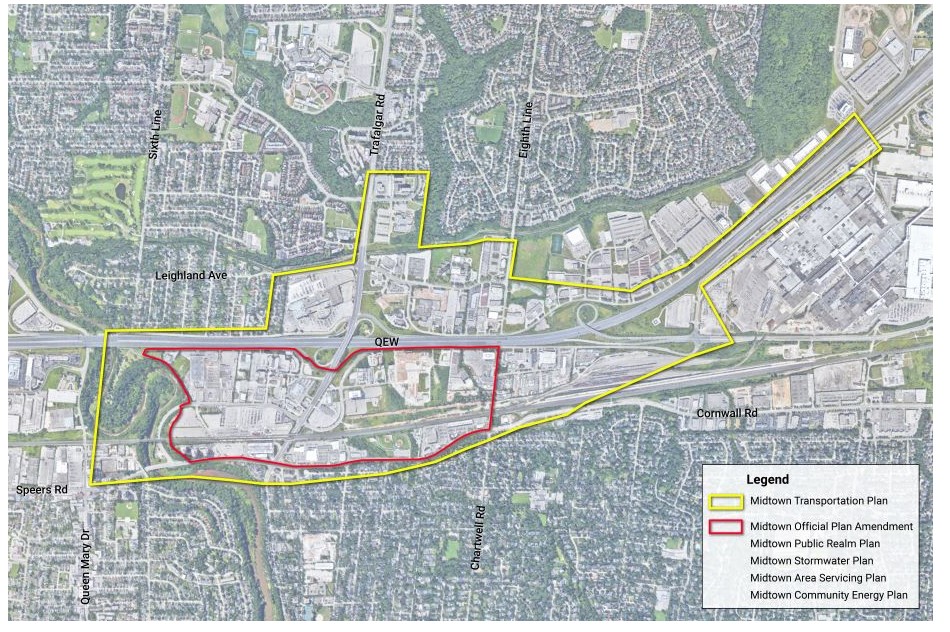
Despite six months and $200,000 in consulting fees, the town appears to have failed to rally people around a vision for development of the Midtown area.
Midtown – a roughly one square kilometre area around the Oakville GO station – is slated to receive the town's densest growth.
Between 30,000 and 60,000 people are forecast to call it home over the next three decades, with nine condo towers ranging in height from 44 to 58 storeys already proposed.
But last May, in the face of public concerns about Midtown's proposed density, building heights, green space, traffic and livability, town councillors hit pause on a draft Official Plan Amendment (OPA) to govern development in the area.
Read more: Councillors vote to do more homework on Midtown development
They created a council committee to hold monthly meetings and do a deep dive into the details of Midtown development. The plan was to explore population expectations, housing types and design features, affordability, sustainability and transportation for the area.
Jacobs Consultancy Canada Inc. was hired to manage the process, with an expectation that it would result in a new draft plan for Midtown by end of 2023.
With that deadline passed, all that has been accomplished so far is the creation of three vague "concept plans" that haven't found many fans.
"It is with great regret that I tell you that we are very disappointed with the results of our work so far," said Carolyn McMinn, head of the Trafalgar Chartwell Residents' Association (TCRA), at a Midtown meeting of town councillors on Dec. 12.
"We had expected a draft amendment which we could understand and which we could support by this point in time," she continued. "We feel we are far from this place."
The process has failed to review best planning practices for high density developments and instead, has created "idealized visions which may or may not be suitable for this plot of land," McMinn added.
Others have also suggested that the concept plans are disconnected from reality.
"In creating concepts, why are we not offering plausible scenarios that reflect the private ownership of various pieces of land around the area and projecting what those owners would possibly intend to develop?" asked Pamela Knight, who heads up the Coronation Park Residents Association.
In a letter to the town, a lawyer for General Electric Canada – whose largely vacant 11 hectare (27 acre) South Service Road property represents one of the largest single-owned parcels of land in the Midtown area – described the concept plans as "three impractical scenarios."
Councillors also heard concerns from the Oakville Community Association, the Bronte Village Residents Association and the Joshua Creek Residents’ Association.
Don't let developers plan growth, says association
With a new draft plan for council's consideration expected in March, resident opposition looks to be spreading.
In a letter recently sent to members and posted to its blog, the Oakville Lakeside Residents Association takes aim at the concept plans.
It notes that they all imagine a dense series of 40-plus storey towers and a Midtown population density three times that of Manhattan.
"Growth in Oakville and Ontario is inevitable and important but must be planned and led by the town, not developers," says the letter.
"To be clear: we are supportive of responsible growth for Midtown and other areas, consistent with the size of the land available and ensuring livability for the community and areas surrounding it."
The group is urging residents to email councillors with a call to keep building heights to an average of 20 stories, to add mid-rise buildings to the mix, and to place tall towers along the QEW and away from the single-family residential neighbourhood south of Cornwall Road.
Like other Oakville community groups, OLRA is also pointing to a 2022 decision by the Ontario Land Tribunal (OLT) that found a municipality is only required to optimize land use, not maximize it.
Highlighted in a presentation by the Oakville Community Association at the December Midtown meeting, the ruling rejected a developer’s proposal for a 22-storey building in Mississauga.
The tribunal ruled that the development was "too ambitious" for the property, as it sought to "maximize the site, as opposed to optimize the site."
When will the infrastructure be built?
A number of other concerns have been raised by residents' groups, including uncertainty about the timing and cost of the infrastructure required to turn Midtown into a functioning neighbourhood.
McMinn said TCRA is troubled by the lack of clarity around the timing of major infrastructure projects controlled by the province and Metrolinx.
"The complete lack of engagement in these proceedings by Metrolinx, the owner of a large part of Midtown, including the land where the re-alignment of Cross Ave is to be located, is significant," she told councillors.
More details can be found on the town's Midtown page, as well as an independent Midtown website established by Ward 3 councillors Janet Haslett-Theall and Dave Gittings.
The Midtown committee will meet again on Jan. 30 at 6:30 p.m.